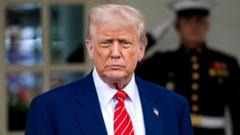The Trump administration is reportedly weighing the suspension of habeas corpus, a fundamental legal principle allowing individuals to contest unlawful detention. This revelation comes from Stephen Miller, the deputy chief of staff, who argued that the Constitution permits such measures during periods of "rebellion or invasion." His remarks arrive in the context of escalating legal challenges concerning recent detentions, particularly those involving undocumented migrants and foreign students expressing dissent.
Judicial responses have varied dramatically, with some judges rebuffing the administration’s actions. Noteworthy cases include federal judges ordering the release of students detained due to controversial expressions, highlighting a contentious legal battleground on immigration and civil liberties.
Miller’s characterization of habeas corpus as a "privilege" rather than an absolute right has stirred debate among legal scholars, who express skepticism towards this interpretation of US law. President Trump has emphasized his commitment to expediting deportations, and discussions about suspending habeas corpus reportedly involve his direct input. However, he has not explicitly endorsed this suspension, only indicating his determination to counter judicial interventions affecting deportation efforts.
Historical context provides insight; habeas corpus has been suspended selectively throughout American history, notably during the Civil War and World War II. However, moving to suspend it without Congressional approval poses significant constitutional dilemmas. As the administration navigates these complex issues, the future of immigration policies and individual rights hangs in the balance.




















